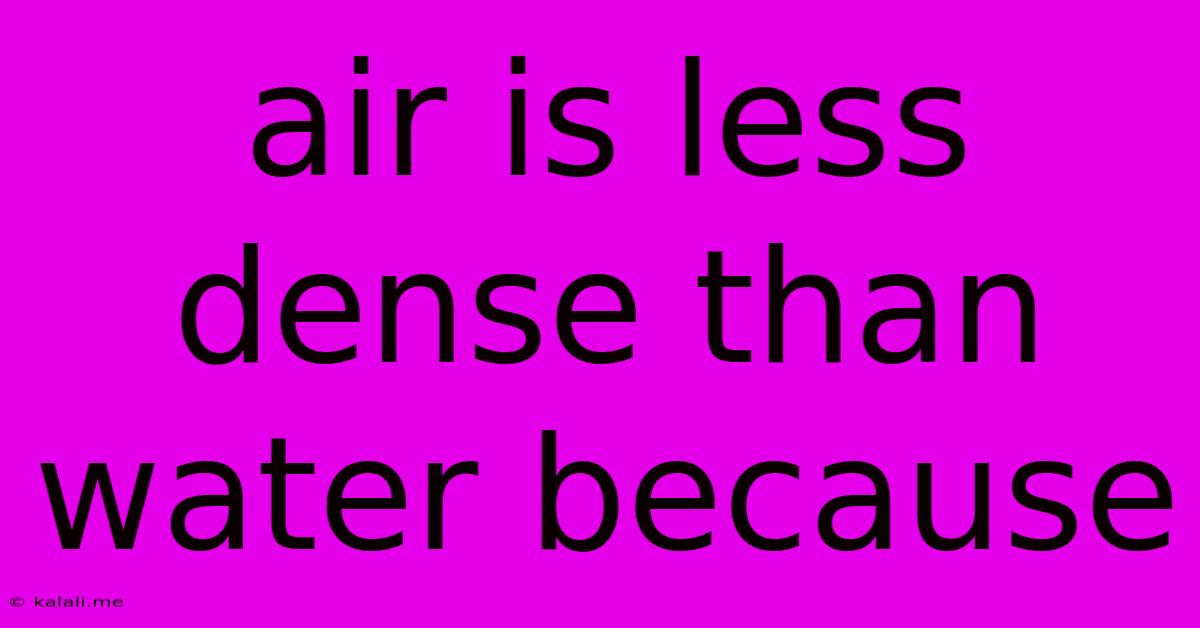Air Is Less Dense Than Water Because
Kalali
Jun 03, 2025 · 3 min read

Table of Contents
Air is Less Dense Than Water Because... The Science Behind the Difference
Air and water are both fluids, but they behave very differently. One key difference lies in their density: air is significantly less dense than water. This seemingly simple fact has profound implications for everything from buoyancy to weather patterns. But why is air less dense than water? This article will explore the fundamental reasons behind this crucial distinction, delving into the molecular structure and forces at play.
Understanding Density: Density is a measure of mass per unit volume. Simply put, it tells us how much "stuff" is packed into a given space. A higher density means more mass in the same volume. Water's higher density compared to air means that the same volume of water contains much more mass than the same volume of air.
The Role of Molecular Structure and Intermolecular Forces
The primary reason for the density difference boils down to the molecular structure and the forces between molecules in each substance.
-
Water (H₂O): Water molecules are relatively small but have a strong polar structure. This polarity leads to strong hydrogen bonds between water molecules, creating a tightly packed structure. These strong intermolecular forces hold the water molecules close together, resulting in a high density.
-
Air: Air is a mixture of gases, primarily nitrogen (N₂) and oxygen (O₂), along with smaller amounts of other gases like argon and carbon dioxide. These gas molecules are much farther apart than water molecules. The intermolecular forces between gas molecules are significantly weaker than the hydrogen bonds in water. This means the molecules in air are much more spread out, leading to a lower density.
The Impact of Molecular Weight
While the intermolecular forces are the dominant factor, the molecular weight also plays a role. Water molecules (H₂O) have a molecular weight of approximately 18 atomic mass units (amu). Nitrogen (N₂) has a molecular weight of around 28 amu, and oxygen (O₂) is approximately 32 amu. While the individual molecules of the gases are heavier than water, the significantly larger spaces between the gas molecules more than compensates for this difference in mass, contributing to air's lower density.
Practical Implications of Density Differences
The density difference between air and water has numerous consequences in our daily lives and in the natural world:
-
Buoyancy: Objects less dense than water will float, while objects denser than water will sink. This is because of the upward buoyant force exerted by the water. Similarly, hot air balloons rise because hot air is less dense than the surrounding cooler air.
-
Weather Patterns: Differences in air density drive weather phenomena like wind and convection currents. Warmer, less dense air rises, while cooler, denser air sinks.
-
Flight: Airplanes fly because their wings are designed to generate lift by manipulating air pressure and density.
-
Scuba Diving & Underwater Pressure: The density of water affects the pressure experienced by divers at increasing depths.
In conclusion, the lower density of air compared to water is a consequence of the weaker intermolecular forces between gas molecules in air and the greater distance between these molecules compared to the tightly packed structure of water due to strong hydrogen bonding. This fundamental difference has far-reaching implications for numerous natural phenomena and technological applications. Understanding this difference is crucial to grasping a wide range of scientific principles.
Latest Posts
Latest Posts
-
Toilet Bowl Water Level Low After Flush
Jun 05, 2025
-
There Are Two Types Of Bad Drivers
Jun 05, 2025
-
How Long Were The Hebrews Slaves To The Egyptians
Jun 05, 2025
-
How Do I Get Cat Pee Out Of Wood Floor
Jun 05, 2025
-
Dst How To Break Science Machine
Jun 05, 2025
Related Post
Thank you for visiting our website which covers about Air Is Less Dense Than Water Because . We hope the information provided has been useful to you. Feel free to contact us if you have any questions or need further assistance. See you next time and don't miss to bookmark.